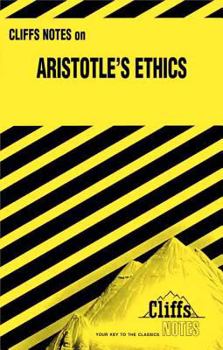Cliffsnotes Aristotle's Ethics
Select Format
Select Condition 
Book Overview
The original CliffsNotes study guides offer expert commentary on major themes, plots, characters, literary devices, and historical background. People have not changed significantly in the many years since Aristotle first lectured on ethics at the Lyceum in Athens. The human types and problems covered in CliffsNotes on Aristotle's Ethics are familiar to everyone. The rules of conduct and explanations of virtue and goodness that he proposes...
Format:Paperback
Language:English
ISBN:0822008890
ISBN13:9780822008897
Release Date:March 1966
Publisher:Houghton Mifflin
Length:112 Pages
Weight:0.28 lbs.
Dimensions:0.3" x 5.5" x 8.4"
Related Subjects
Ancient & Classical Literature Education Education & Reference Education & Training Europe Greece Greek History & Surveys Humanities Literature Medieval Movements & Periods Philosophy Politics & Social Sciences Schools & Teaching Study Study & Teaching Study Aids Study Guides Study Skills Studying & Workbooks Test Prep & Study Guides TextbooksCustomer Reviews
2 ratings
Save's time and understanding
Published by Thriftbooks.com User , 15 years ago
Really help me so I didn't have to read to whole books since my time is limited.
We Reach Our Complete Perfection Through Habit
Published by Thriftbooks.com User , 16 years ago
I read this book for a graduate seminar on Aristotle. I think Aristotle's ethics is his most seminal work in philosophy. In the early 1960's virtue ethics came to fore. It is a retrieval of Aristotle. It has very close parallels to the ancient Chinese philosophy of Confucius and the modern philosophy espoused in the 1970's called Communitarianism. For Aristotle Nicomachean Ethics, (EN) is about human life in an embodied state. Area of inquirery for EN is "good" this is his phenomenology. What does "good" mean? He suggests good means "a desired end." Something desirable. Means towards these ends. Such as money is good, so one can buy food to eat because "eating is good." In moral philosophy distinction between "intrinsic good" vs. "instrumental good." Instrumental good towards a desire is "instrumental good" like money. Thus, money is an "instrumental good" for another purpose because it produces something beyond itself. Instrumental good means because it further produces a good, "intrinsic good" is a good for itself, "for the sake of" an object like money. "Intrinsic good" for him is "Eudemonia=happiness." This is what ethics and virtues are for the sake of the organizing principle. Eudemonia=happiness. Today we think of happiness as a feeling. It is not a feeling for Aristotle. Best translation for eudaimonia is "flourishing" or "living well." It is an active term and way of living for him thus, "excellence." Ultimate "intrinsic good" of "for the sake of." Eudaimonia is the last word for Aristotle. Can also mean fulfillment. Idea of nature was thought to be fixed in Greece convention is a variation. What he means is ethics is loose like "wealth is good but some people are ruined by wealth." EN isn't formula but a rough outline. Ethics is not precise; the nature of subject won't allow it. When you become a "good person" you don't think it out, you just do it out of habit! You can have ethics without religion for Aristotle. Nothing in his EN is about the afterlife. He doesn't believe in the universal good for all people at all times like Plato and Socrates. The way he thought about character of agent, "thinking about the good." In addition, Aristotle talked about character traits. Good qualities of a person who would act well. Difference between benevolent acts and a benevolent person. If you have good character, you don't need to follow rules. Aretç=virtue, in Greek not religious connotation but anything across the board meaning "excellence" high level of functioning, a peak. Like a musical virtuoso. Ethical virtue is ethical excellence, which is the "good like." In Plato, ethics has to do with quality of soul defining what to do instead of body like desires and reason. For Aristotle these are not two separate entities. To be good is how we live with other people, not just focus on one individual. Virtue can't be a separate or individual trait. Socrates said same the thing. Important concept for





